Estimated reading time: 6 minutes
Growing your own herb garden may result in a frustrating situation when you have more herbs than you can use before they start to wilt. So, what should you do to use those herbs without wasting them?
While there are many ways to preserve herbs, including air drying or freezing them, preserving them in vinegar is a quick and easy way to use herbs later.
While we all have our favorite herbs that we often add to garnish soups, salads, and sandwiches, you may want to consider experimenting with other types of herbs that grow naturally in your area.
Preserving herbs in vinegar is a great way to save the fresh flavor of a season to use later. Herb-infused vinegar can be used as a salad dressing or in combination with other flavors for meals. Learn how to preserve herbs with vinegar by following these tips.
Want to save this post for later? Click Here to Pin It On Pinterest!
An Overview of Herbs
Before we start preserving herbs, we may want to know precisely what an herb is. By definition, an herb is considered any plant with leaves, seeds, or flowers used for flavoring, medicine, food, or perfume.
Another definition notes that herbs are any seed-bearing plant without a woody stem that dies down after flowering. It is important to note that herbs do not include fruits or vegetables.
Types of Vinegars
When preserving herbs in vinegar, not all vinegars are the same. While you can use any vinegar (with around 5% acidity) to preserve herbs, there are some recommended combinations.
Apple Cider Vinegar
This sweet and mild vinegar can handle the stronger herbs and spices but has a brown hue that may not be as pretty as clear options. Try out the combination of lavender, oregano, tarragon, thyme, or rosemary in an apple cider vinegar preserve.
Balsamic Vinegar
Great for dressings and marinades, balsamic vinegar has a strong taste that isn’t usually used for preserving most herbs.
Champagne Vinegar
This more expensive vinegar is made from dry white wine and is great for use with herbs that have a delicate flavor. Delicate herbs and flavors like lemon verbena, lemon balm, lemongrass, lavender, and dandelion pair better with champagne vinegar.
Malt Vinegar
This very strong vinegar is often used for pickling vegetables or making mustard. Robust flavors like chives and mustard seed do best in the strong flavor of malt vinegar.
Rice Vinegar
As a product of rice wine, this vinegar is an excellent choice for preserving herbs. Choose from different varieties such as red, white, or black. Delicate herbs like fennel and thyme work well in rice vinegar.
Sherry Vinegar
Made from sherry wines, this vinegar smells wonderful and is often chosen for those vinegars and herbs meant to use as dressings. Try out parsley, sage, rosemary, and thyme in a sherry vinegar mixture for the perfect gift.
White Vinegar
Made from grain, this popular pantry staple is not recommended for preserving herbs as it is robust in taste and overwhelms the herb flavor.
Wine Vinegar
The favorite among homesteaders, wine vinegar is made from white, red, or rose wines and are a good match for preserving herbs.
Use this light-tasting vinegar to complement the flavor profiles of parsley, thyme, rosemary, basil, tarragon, dill, and lemon balm. This vinegar pairs well with stronger flavors like dill weed, dried red peppers, tarragon, rosemary, thyme, oregano, and sage.
What You’ll Need to Preserve Herbs with Vinegar
There are only a few things you’ll need to help preserve herbs for the future:
- 1 gallon of vinegar of your choosing
- Pint-sized canning jars with new lids
- Plastic wrap
- 4-5 sprigs, or 1 cup, of herbs per canning jar
- Optional spices like chili flakes, salt, and garlic
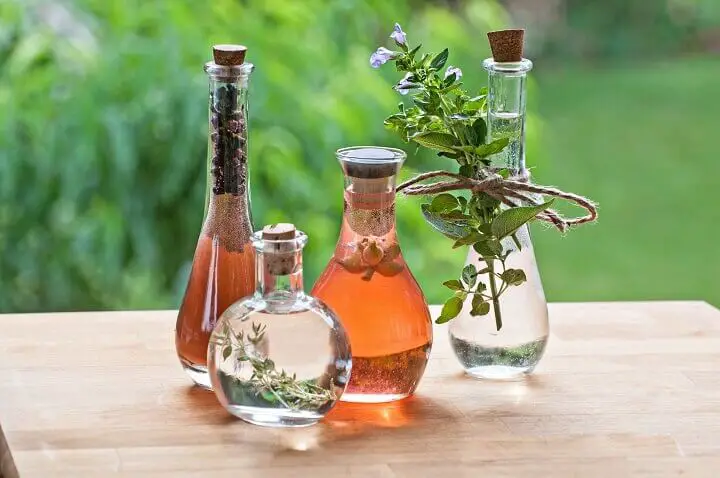
How to Preserve Herbs with Vinegar
Preserving herbs with vinegar is a great way to save the freshness of the plant itself while also creating a useful dressing in the process.
- Pour two cups of vinegar into a clean pint jar. Take about 3-4 sprigs, or one cup, of fresh herbs and slightly break the leaves to help release the flavor. Put the sprigs in the jar and then add any other spices, if desired. Some homesteaders use ½ teaspoon of chili flakes, a clove of garlic, or a pinch of salt in the mix.
- Cover the top of the jar with plastic wrap, and then place the lid and band on the top of the jar to seal tightly. Set the jar aside to allow the herbs to steep and infuse into the vinegar for about 1-4 weeks. The overall flavor of the vinegar will grow stronger if allowed to steep for a longer period of time.
- Using cheesecloth or a fine-mesh sieve, strain the mixture into another jar or bottle to remove the herb stem and leaves. The vinegar is finished at this point, but you could add an extra sprig of the herb used to the bottle so that users know what kind of vinegar it is. Sometimes citrus peels, peppercorns, or other spices are also added at this point.
- After straining, simply store the vinegar in the fridge or process the jars by canning to make them shelf-stable for years to come. Process pint jars for 10 minutes in a boiling water bath canner with ¼ inch headspace.
The best part about preserving herbs with vinegar is that there really is no right or wrong way to do it. You can experiment with different flavors and tastes depending on what your family likes and what looks best if giving them away as gifts.
Try adding different spices and other fruits grown on your land that could create a unique flavor all your own!
Remember that vinegar doesn’t play well with metal, so be sure to only use glass jars during this process. Placing a protective barrier between the vinegar and the metal lid is also helpful to guard against any bad reactions.
When you find yourself up to your ears in basil, thyme, or whatever kind of herb you like to grow in the garden, remember these tips on how to preserve herbs with vinegar.
Not only do herb-infused vinegars make great additions to any meal, but they also allow you to enjoy the freshness of these summer flavors no matter when you crack open the jar.
Like this post? Don't Forget to Pin It On Pinterest!

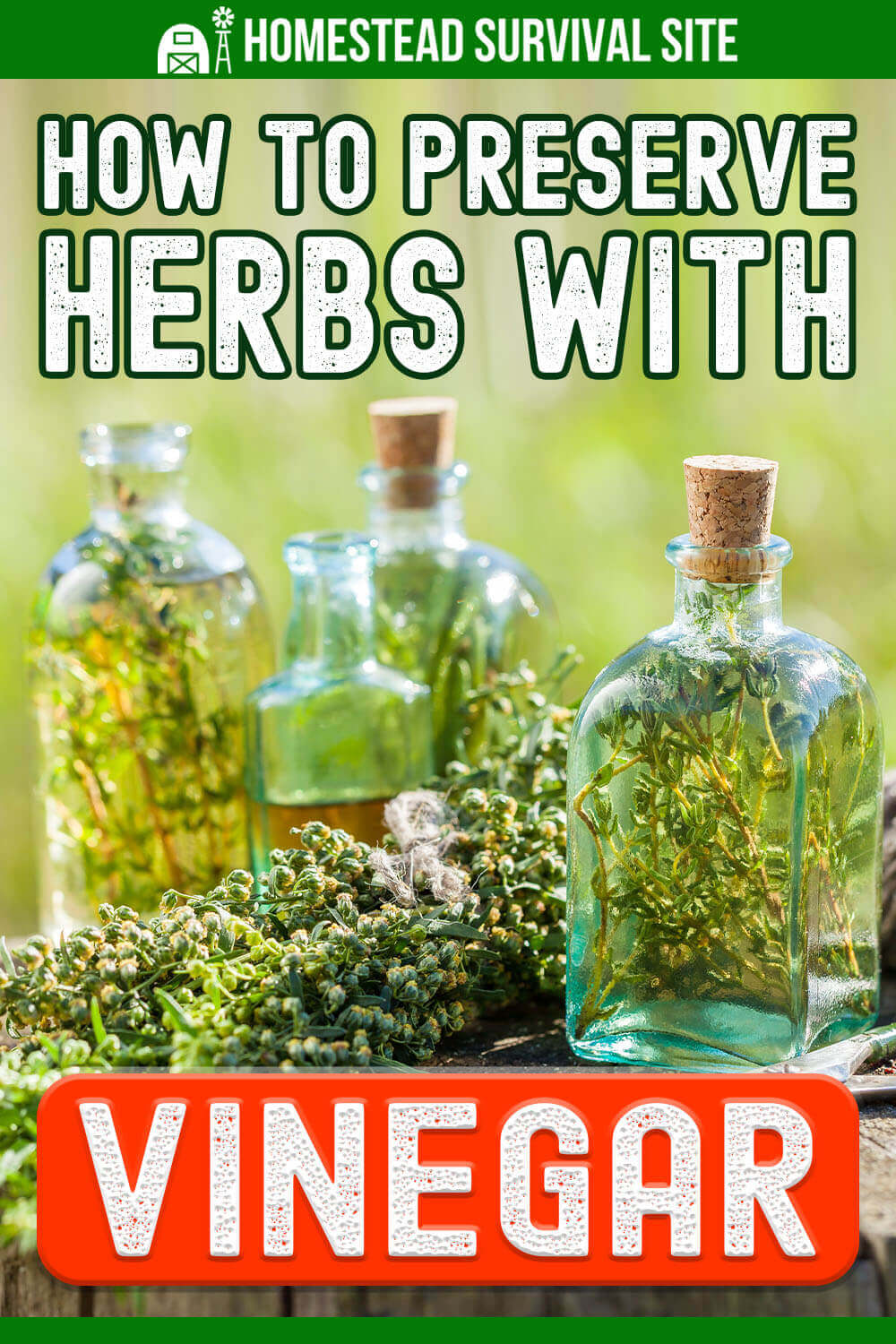


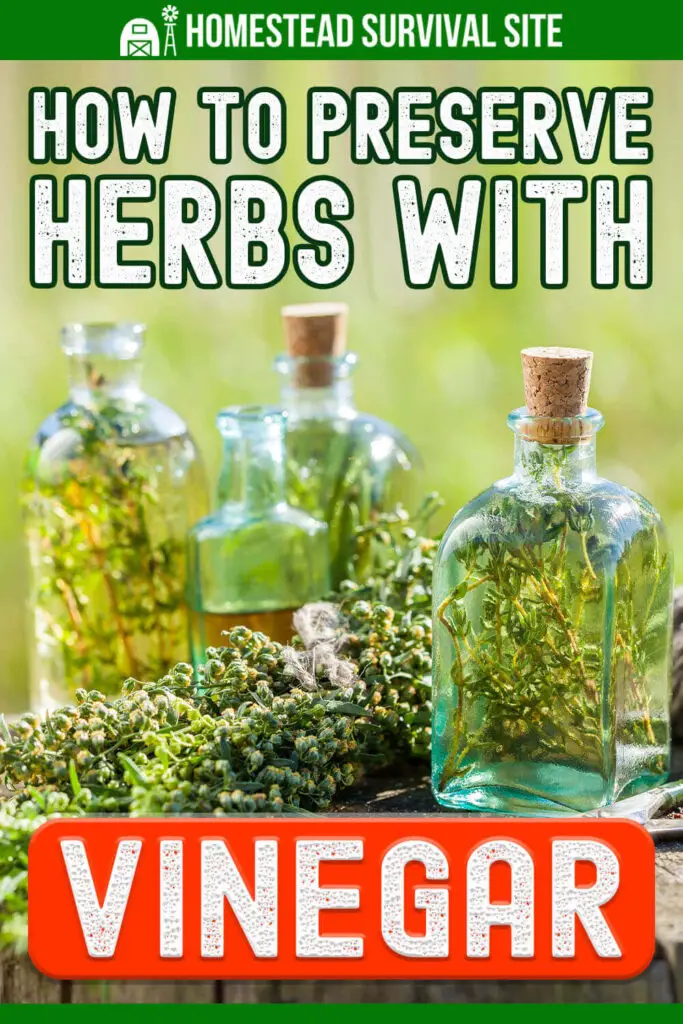

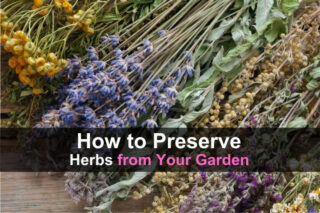
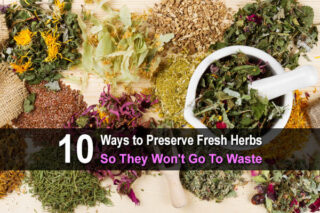





Intriguing. I will have to get around to trying this eventually. Something new to learn and practice.